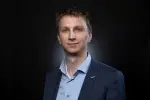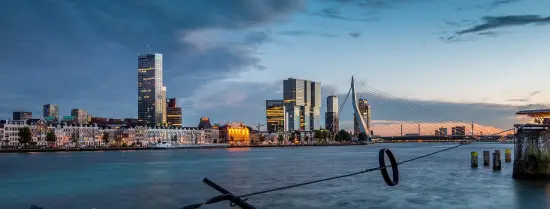Senior Researcher and Advisor port transition

- Email address
- koppenol@ese.eur.nl
- Phone
- +31 (6) 21981379
- Room
- Mandeville room T19-41
- Address
- Burgemeester Oudlaan 50
3062 PA
Rotterdam
Dr. Dirk Koppenol (1987) has been active in the Rotterdam port innovation ecosystem of Rotterdam for over 10 years. He studied history and public administration. Dirk worked at TNO, the Port of Rotterdam Authority and SmartPort Rotterdam, among others; at the latter as a researcher, strategist and interim director. Since 2023 he has been active as a sr. researcher and advisor port transition at Erasmus UPT.
For more than 10 years Dirk has been actively involved in research into:
Smart and sustainable transport and logistics & sustainability of port-industrial complex. He was editor and co-author of the report: 10 SmartPort Trends 2030-2050 (2021) (linkOpens externalOpens external) In which the important opportunities for seaports have been mapped out.
Seaport development. His dissertation was about the decision-making processes of infrastructural mega projects in and around ports (published by Boom publisher: Lobby for Land (2016) (linkOpens externalOpens external). He was also involved in project research into the spatial development of the port of Rotterdam until 2050.
Development and deployment of serious games. In a team, based on scientific research, he developed the INDEEP course, which allows you to better estimate the chances of your radical innovation in 7 steps. He was also involved in the development of serious games for port development (Port Constructor) and pressure cookers for innovation acceleration.
Expertise
Dirk gets energy from developing action perspectives and decision-making information for ports, port companies and governments. This can only be done through join-fact finding - searching together for the important challenges and turning them into opportunities. He is committed at both administrative/strategic and operational level. The projects that Dirk develops are aimed at ports, but always have a system component, which also includes the chain. Because only together can you accelerate innovation.
Dirk Koppenol focuses on the following research areas at UPT:
• Opportunities of the energy transition for seaports and (port) companies
• Strategy development seaports & social innovation
• Serious game development for innovation acceleration
Publications and Projects:
Editor and writer:
Koppenol, D.M. (Ed.), 10 SmartPort Trends 2030-2050. Based on 6 years of SmartPort research in cooperation with various knowledge institutes and universities and more than 400 companies. (Rotterdam 2021) (link).
Koppenol, D.M. (Ed.), De kracht van het mainportconcept. Een ontstaansgeschiedenis en toekomstvisie (Den Haag 2015).
Writer:
Koppenol, D.M., Lobby for Land. A historical perspective (1945-2008) on the decision-making process for the port of Rotterdam land reclamation project Maasvlakte 2 (Amsterdam 2016).
Chapter(s) in a book (Professional):
Kuipers, Bart, Koppenol, Dirk, Paardenkooper, Klara en, Van Driel, Hugo, Rotterdamse Container Kopstukken. Honderd jaar containermainport Rotterdam 1966-2066 (Rotterdam 2018).
Klemann, H.A.M. & Koppenol, D.M., Port Competition within the Le-Havre-Hamburg range (1850-2013), in: B. Kuipers & R.A. Zuidwijk (Eds.), Smart Port Perspectives. Essays in honor of Hans Smits (Rotterdam 2013) 63-76.
Koppenol, D.M., Think global, act local: Maasvlakte II en het Mainportconcept (1993-2008). In Dirk.M. Koppenol (Ed.), De kracht van het mainportconcept. Een ontstaansgeschiedenis en toekomstvisie (Den Haag 2015).
Contribution in proceedings (Professional):
Koppenol, D.M. (2011). The Rhine Economy on a New Basis. The Switch from Coal to Oil and the Implications for the Transnational Rhine Region, 1945-1973. In The Rhine Economy on a New Basis. The Switch from Coal to Oil and the Implications for the Transnational Rhine Region, 1945-1973.
Conference papers:
Koppenol, D.M. (2014). Conflicts about the Extension of the Rhine Economy. The case of the port expansion by Maasvlakte II (1969-2008). 5th Transnational Rhine Conference: Mainz (2014, October 30 - 2014, November 1).
Koppenol, D.M. (2013). Megaproject Maasvlakte II, an offer you can't refuse? Path creation and the Maasvlakte II expansion of the port of Rotterdam (1993-2008). European Business History Association: Uppsala (2013, August 22 - 2013, August 24).
Koppenol, D.M. (2014). How to settle conflicts during port development. The case of the port of Rotterdam (1973-2008). Seaports in Transition-Conference: Hamburg.
Koppenol, D.M. (2014). THINK GLOBAL, ACT LOCAL: MAASVLAKTE II EN HET MAINPORTCONCEPT (1993-2008). Conferentie: Mainport: verleden, heden en toekomst?: Rotterdam (2014, November 14).
Koppenol, D.M. (2014). The megaproject effect. Entrepreneurship during the decision-making process of Maasvlakte II (1993-2008). N.W. Posthumus Conference: Leeuwarden (2014, June 5 - 2014, June 6).
Koppenol, D.M. (2012). Governmental devolution programs for ports in Northwestern Europe. The case of the port of Rotterdam (1990s-2005). European Business History Association: Parijs (2012, August 30 - 2012, September 1).
Koppenol, D.M. (2011). The decision-making process of Maasvlakte ll (1969-2008). Posthumus Research Colloquium: Leiden (2011, December 12 - 2011, December 13).
A selection of recent projects by Dirk Koppenol.
Description: This research focuses on the nomination process in Rotterdam's petrochemical cluster, crucial for liquid bulk cargo transportation. Changes in customs processes require more accurate and up-to-date cargo information. Delays and inefficiencies in operations, especially for inland shipping, indicate hiccups. Improved information exchange can increase efficiency and facilitate customs adjustments. The research highlights the Dutch logistics sector, digitalization needs and future resource transitions to renewable energy sources. The research is in the context of improved data exchange, logistics efficiency and adaptations to future logistics needs in Rotterdam.
Duration: 2023
Client: Topsector Logistiek
Description: This position paper highlights the need for new guidance on investment in seaports, focusing on broader welfare values in addition to economic values. It calls for clear indicators and a consistent consideration framework to support investment decisions. Erasmus UPT proposes a new guideline, based on interviews with various stakeholders, that encompasses economic, strategic, and societal values, with a focus on long-term value creation and enhanced dialogue between governments, port operators and industry. It seeks consensus and acceptance from all stakeholders for effective decision-making on port developments and investments.
Duration: 2023
Client: N.a.
Description: The research emphasizes AI's pivotal role in future ports, addressing challenges like energy transitions, climate change, autonomous transport, and workforce ageing. Despite readiness, AI adoption lags due to data scarcity, issues surrounding trust and unclear benefits. This suggests a step-by-step approach for adoption, bridging industry focus and academic trajectories. Recommendations for the AI Port Center include tailored industry cases, collaborative research, and a shared vision for future ports. The motto "Dream big, start small" encapsulates the need for gradual AI integration while highlighting its potential in revolutionizing port logistics.
Duration: 2023
Client: AI Port Centre
Description: Trajectory in which a research agenda is developed with the NGinfra partners, research institutions and external parties. The aim is to produce supported common (cross-sectoral) goals to set in a world of energy transition, climate change, scarcity of resources and the rise of widespread prosperity.
Duration: 2023 - (ongoing)
Client: NGinfra (Schiphol, Port of Rotterdam, Alliander, Vitens, ProRail en Rijkswaterstaat)
Description: This research focuses on the necessity to reduce shipping emissions by investigating fuel transitions for the Port of Rotterdam. It involves a transdisciplinary approach with experts from diverse domains to assess the feasibility and necessity of ammonia as a marine fuel, along with other fuels and energy-saving methods. Its aim is to enhance collaboration among stakeholders for a sustainable port.
Duration: 2023
Client: Resilient Delta
